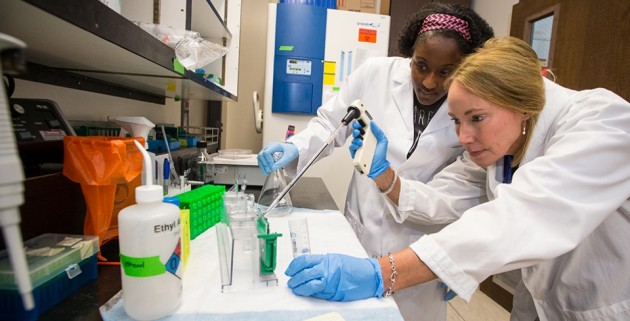REAL News for REAL People
Cellular Standoff
Publisher's note: The author of this post, Doug Boyd, is a contributor to ECU News Services.
Scientists at East Carolina University are taking a closer look at the intercellular war that goes on between viruses and the human immune system in an effort to design better drugs to target the germs.
Rachel Roper, an associate professor of microbiology and immunology at the Brody School of Medicine at ECU, is a principal investigator on a National Institutes of Health grant totaling nearly $2.6 million to study the human-virus interaction.
"There's a competition between a virus and the immune system as to which can amplify itself fast enough to beat the other," Roper said. "If the virus wins, the human dies. If the immune system wins, the virus is — usually — eliminated from the body."
 She brings special expertise to the research. In 2006, she discovered a poxvirus gene, A35R, which blocks the first step in the immune response. Methods of removing the gene from poxviruses, thereby increasing their safety and effectiveness, are now patented.
She brings special expertise to the research. In 2006, she discovered a poxvirus gene, A35R, which blocks the first step in the immune response. Methods of removing the gene from poxviruses, thereby increasing their safety and effectiveness, are now patented.
Her collaborator is Laurence "Ike" Eisenlohr of the University of Pennsylvania. At the time the grant was awarded, he was a faculty member at Thomas Jefferson University in Philadelphia. Eisenlohr is an expert in immunology.
Researchers will focus on the relationship between CD4+ T cells — a certain type of lymphocyte, or white blood cell, which is critical for protection against most viruses — and two prototypical poxviruses that have developed ways to avoid being recognized by CD4+ T cells. Scientists will look to uncover those detection-avoidance methods and gain insight into how the immune system circumvents them.
What scientists learn about how A35R works inside the cell and how it blocks immune cell functions could point to improved vaccines and new ways to treat autoimmune diseases, Roper said.
Poxviruses have been commonly used to develop vaccines in humans, but a key limitation has been what is called a "virulence gene." Viruses, having co-evolved with humans over millennia, are adapted to exploiting vulnerabilities in human immune systems. These genes, including A35R, suppress the immune system to allow the virus to proliferate in the human host.
In addition, poxviruses are used to create vaccines for many other diseases — rabies, malaria and Middle East respiratory syndrome, to name three. Poxvirus-derived vaccines are also used to treat cancer and are the only ones thus far that have protected humans from HIV in clinical trials.
"Our data indicate that the use of our A35 discovery will improve the safety and efficacy of all these vaccines," Roper said.
A35R may also provide a target for drug design. "If we can find a drug that blocks A35, we will have a new antiviral drug," Roper said.
Finally, Roper said, if scientists can find out how to use A35R or mimic its actions, they might be able to turn off the responses that cause autoimmune diseases such as lupus or prevent rejection of transplanted tissues and organs.
Roper's lab will receive approximately $624,000 from the four-and-a-half-year grant. The title of the study is "MHCII cross-presentation as a driver of CD4+ T cell responses to poxviruses."

Dr. Rachel Roper, right, and lab technician Gwen Jones conduct research funded by a $2.6 NIH grant to study interactions between viruses and the human immune system. (Photos by Cliff Hollis)
Go Back
Researchers aim for better vaccines, medicines
Scientists at East Carolina University are taking a closer look at the intercellular war that goes on between viruses and the human immune system in an effort to design better drugs to target the germs.
Rachel Roper, an associate professor of microbiology and immunology at the Brody School of Medicine at ECU, is a principal investigator on a National Institutes of Health grant totaling nearly $2.6 million to study the human-virus interaction.
"There's a competition between a virus and the immune system as to which can amplify itself fast enough to beat the other," Roper said. "If the virus wins, the human dies. If the immune system wins, the virus is — usually — eliminated from the body."

Research underway at East Carolina University may help create better vaccines and medicines.
Her collaborator is Laurence "Ike" Eisenlohr of the University of Pennsylvania. At the time the grant was awarded, he was a faculty member at Thomas Jefferson University in Philadelphia. Eisenlohr is an expert in immunology.
Researchers will focus on the relationship between CD4+ T cells — a certain type of lymphocyte, or white blood cell, which is critical for protection against most viruses — and two prototypical poxviruses that have developed ways to avoid being recognized by CD4+ T cells. Scientists will look to uncover those detection-avoidance methods and gain insight into how the immune system circumvents them.
What scientists learn about how A35R works inside the cell and how it blocks immune cell functions could point to improved vaccines and new ways to treat autoimmune diseases, Roper said.
Poxviruses have been commonly used to develop vaccines in humans, but a key limitation has been what is called a "virulence gene." Viruses, having co-evolved with humans over millennia, are adapted to exploiting vulnerabilities in human immune systems. These genes, including A35R, suppress the immune system to allow the virus to proliferate in the human host.
In addition, poxviruses are used to create vaccines for many other diseases — rabies, malaria and Middle East respiratory syndrome, to name three. Poxvirus-derived vaccines are also used to treat cancer and are the only ones thus far that have protected humans from HIV in clinical trials.
"Our data indicate that the use of our A35 discovery will improve the safety and efficacy of all these vaccines," Roper said.
A35R may also provide a target for drug design. "If we can find a drug that blocks A35, we will have a new antiviral drug," Roper said.
Finally, Roper said, if scientists can find out how to use A35R or mimic its actions, they might be able to turn off the responses that cause autoimmune diseases such as lupus or prevent rejection of transplanted tissues and organs.
Roper's lab will receive approximately $624,000 from the four-and-a-half-year grant. The title of the study is "MHCII cross-presentation as a driver of CD4+ T cell responses to poxviruses."

Dr. Rachel Roper, right, and lab technician Gwen Jones conduct research funded by a $2.6 NIH grant to study interactions between viruses and the human immune system. (Photos by Cliff Hollis)
| Governor McCrory Announces Eight North Carolinians To Receive Prestigious Heritage Award | East Carolina University, School News, The Region, Neighboring Counties | Top Tier |
Latest Neighboring Counties
|
Republicans Bokhari and Driggs retain seats on city council.
Published: Tuesday, March 26th, 2024 @ 12:50 am
By: Carolina Journal
|
|
Members of the North Carolina Rural Health Association (NCRHA) visited Washington, D.C., on Feb. 14, 2024, to meet with elected officials and advocate for policies to improve access to care in rural areas.
Published: Wednesday, February 28th, 2024 @ 12:51 am
By: Eastern NC NOW Staff
|
|
The US Supreme Court will not take the case of Virginia-based owners of a Dare County beach home who challenged the county's COVID-related shutdown in 2020.
Published: Tuesday, February 6th, 2024 @ 10:14 pm
By: Carolina Journal
|
|
The North Carolina State Fair is set for the Raleigh state fairgrounds from October 12-22, 2023
Published: Friday, February 2nd, 2024 @ 9:01 am
By: Carolina Journal
|
|
A $2.5-billion-dollar bond referendum is slated to be placed on the November ballot this year, as Charlotte-Mecklenburg Schools (CMS) looks for support to fund 30 different projects in the school district.
Published: Sunday, January 14th, 2024 @ 10:08 am
By: Carolina Journal
|
|
Five Asheville-area residents are suing the city in federal court for refusing to appoint them to the local Human Relations Commission. The residents claim they were rejected because they are white.
Published: Saturday, December 9th, 2023 @ 11:53 am
By: Carolina Journal
|
|
Federal grant expands midwifery care for North Carolina
Published: Wednesday, November 29th, 2023 @ 2:59 pm
By: ECU News Services
|
|
Pirates achieve historic sponsored activities funding
Published: Tuesday, November 28th, 2023 @ 10:03 am
By: ECU News Services
|
|
Innovative new MBA pathway provides leadership experiences for students, companies
Published: Saturday, November 18th, 2023 @ 10:42 am
By: ECU News Services
|






















